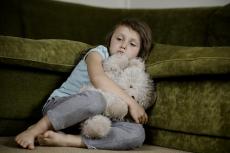Helping Your Child With Anxiety
 Childhood anxiety appears in many forms, making it difficult to identify, understand and treat. Sometimes you may not be sure if your child is struggling with anxiety or something else. Regardless, arriving at a point where you are not certain what to do for your child anymore can be just as stressful on you, as the caregiver. In our current state with virtual learning, lack of community sports and extracurricular activities, we find our children isolating and becoming withdrawn. As a caregiver, you often wonder what you can do to be supportive, how you can make life as “normal” as possible for your children, and what resources are available to help children through these difficult times. Here are a few things to look for when dealing with childhood anxiety:
Childhood anxiety appears in many forms, making it difficult to identify, understand and treat. Sometimes you may not be sure if your child is struggling with anxiety or something else. Regardless, arriving at a point where you are not certain what to do for your child anymore can be just as stressful on you, as the caregiver. In our current state with virtual learning, lack of community sports and extracurricular activities, we find our children isolating and becoming withdrawn. As a caregiver, you often wonder what you can do to be supportive, how you can make life as “normal” as possible for your children, and what resources are available to help children through these difficult times. Here are a few things to look for when dealing with childhood anxiety:
- Poor sleeping habits that have randomly developed
- Decrease appetite/feeling nauseous
- Irritable
- Behavioral outbursts/easily triggered
- Tearful
- Not wanting to be alone, when normally able to function well independently
Helping kids through anxiety can be rather difficult because in some cases, your child may not know why they are feeling anxious, leaving you as the caregiver at a complete loss on how to “fix” the problem. One thing we want to avoid is telling our anxious child to “get over it.” This can actually make the situation worse, and will often lead to the child feeling they cannot talk to you about what they are feeling. The following are some effective steps to take to help your child:
Be Present - Your child needs to know you are there for them, even if they cannot articulate what is wrong, or what they are feeling. Listen, provide support, and encourage them to talk about what is going on, or what they need from you. While you may not understand their reason for being triggered, relate to the feeling of being triggered, to engage in positive communication.
Get Active - Sometimes a little movement helps reduce those anxious feelings. Take a walk with your child, head to the park to play, or do an in-home exercise together to help release those happy endorphins.
Ask for Help - It is okay to feel you have tried everything and still see your child struggling. It is also okay as a caregiver, to ask for help. Reach out to your child’s school guidance counselor, contact their therapist, or reach out to our admissions department at 301-733-0330 to schedule an evaluation. Sometimes the best support and efforts require a larger support system and we have you covered!
Treating Anxiety at Home - Treating anxiety is a process of understanding our triggers and our thoughts, as well as learning and adapting to new coping skills. As a caregiver, you can encourage coping skills like deep breathing, grounding techniques and coloring activities that help calm your anxious child. Review the resources below for ideas:
Karley Hensley, LCPC is a licensed clinical professional counselor with Brook Lane. She is the Inpatient Clinical Supervisor on main campus and has more than 15 years of experience working with children and adolescents in a variety of settings from shelters, group homes, residential, outpatient, and inpatient programs. Karley is a graduate of Frostburg State University with a bachelor’s and master’s degrees in counseling psychology. She is currently pursuing her PhD in Advanced Human Behaviors and Counseling.
